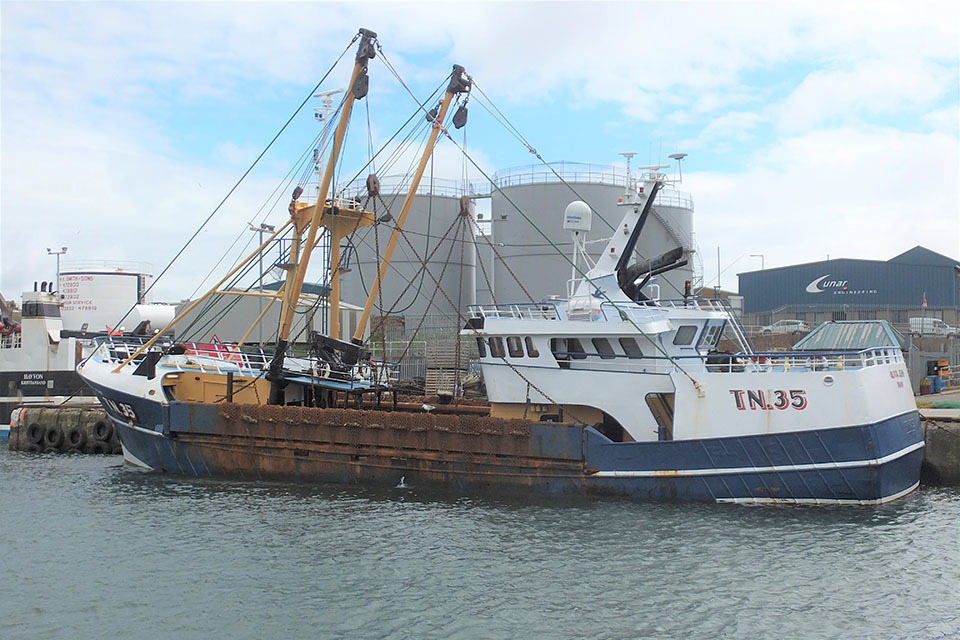Safety flyer to the fishing industry - Olivia Jean
Published 12 May 2021
1. Summary
Fatal accident to a crewman on board the scallop dredger Olivia Jean (TN35), north-east of Aberdeen, Scotland on 28 June 2019

2. Narrative
At about 2200 on 28 June 2019, an Indonesian crewman on board the scallop dredger Olivia Jean was fatally injured after being struck on the head by one of the vessel’s scallop dredge towing bars while working on deck.
The crewman had replaced two worn dredges on the towing bar and stood clear as the skipper used the winches and derrick to lift and realign the gear against the vessel’s tipping door. Unfortunately, one of the towing bar’s securing chains had not been released and the dredge gear became snagged. Although the skipper shouted instructions to the crewman to remain clear as he attempted to free the gear, the crewman stepped between the snagged bar and the accommodation superstructure just as the snagged bar released and swung inboard.
The crewman suffered crush injuries to his head and was airlifted from the vessel and taken to hospital for emergency treatment. He died 12 days later.
The dredge gear winches and the two crew members working on deck were being controlled by the skipper from the wheelhouse. The location of the accident was out of the skipper’s line of site and he was reliant on a CCTV screen that was positioned behind him to monitor the area. The deck crew’s level of English comprehension was poor, and they did not speak a common language.
In August 2020, a British crewman on the Olivia Jean was struck by a towing bar during a dredge gear shooting operation. He moved out of the designated safe zone before being given the clearance to leave, stepped into an unsafe area and was struck by the towing bar when it unexpectedly moved. The injured fisherman was taken to hospital for emergency treatment.
3. Safety Lessons
-
The shooting, hauling, and moving of dredge gear are extremely hazardous activities that need to be tightly controlled. No matter how experienced the crew on deck might be, they need to be properly supervised and their safety closely monitored.
-
The crew on deck may not be visible to the winch or machinery operator, so clear, explicit and easily understood communications are vital to the avoidance of dangerous situations from developing. This is particularly the case where the crew do not share the same first language.
-
Learning lessons from previous accidents can prevent injuries and save lives. In this case, the lessons learned and corrective action implemented did not prevent a near identical accident from occurring to the crew on board in August 2020. It was very fortunate that it did not result in another fatality.
Our accident investigation report is available at: https://www.gov.uk/maib-reports/crush-incident-on-scallop-dredger-with-loss-of-1-life.
Extract from The United Kingdom Merchant Shipping (Accident Reporting and Investigation) Regulations 2012 – Regulation 5:
The sole objective of the investigation of an accident under the Merchant Shipping (Accident Reporting and Investigation) Regulations 2012 shall be the prevention of future accidents through the ascertainment of its causes and circumstances. It shall not be the purpose of an such investigation to determine liability nor, except so far as is necessary to achieve its objective, to apportion blame.
Note:
This safety flyer is not written with litigation in mind and, pursuant to Regulation 14(14) of the Merchant Shipping (Accident Reporting and Investigation) Regulations 2012, shall be inadmissible in any judicial proceedings whose purpose, or one of whose purposes is to attribute or apportion liability or blame.
Marine Accident Investigation Branch
First Floor, Spring Place
105 Commercial Road
Southampton
SO15 1GH
Email iso@maib.gov.uk
Enquiries during office hours +44 (0)23 8039 5500

